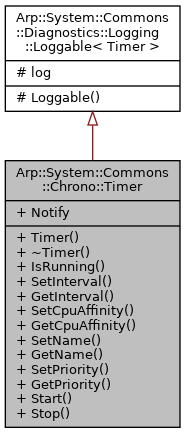High resolution timer for interval based executions. More...
#include <Timer.hpp>

Public Types | |
| typedef event< void > | NotifyEvent |
| Definition of list of delegates to be called when timer expires. | |
Public Member Functions | |
| Timer (size_t interval, const String &name, size_t priority, size_t cpuAffinity=0) | |
| Constructs an Timer instance. More... | |
| ~Timer (void) | |
| Destructs this instance and frees all resources. | |
| bool | IsRunning (void) const |
| Checks if the timer is running, i.e. Start was already invoked. More... | |
| void | SetInterval (size_t interval) |
| Changes the interval in which the assigned methods are called. More... | |
| size_t | GetInterval (void) const |
| Returns the interval value in microseconds. More... | |
| void | SetCpuAffinity (size_t affinity) |
| Pins the timer to a specific CPUs inside a multiprocessor system. More... | |
| size_t | GetCpuAffinity (void) const |
| Returns the current used CPU affinity mask. More... | |
| void | SetName (const String &value) |
| Sets a new name for the timer. More... | |
| const String & | GetName (void) const |
| Returns the current name of the timer. More... | |
| void | SetPriority (size_t value) |
| Sets a new scheduling priority for the timer. More... | |
| size_t | GetPriority (void) const |
| Returns the current scheduling priority of the timer. More... | |
| void | Start (void) |
| Starts the execution of the timer. More... | |
| void | Stop (void) |
| Stops the execution of the timer. | |
Public Attributes | |
| NotifyEvent | Notify |
| List of class methods and classes that are called periodically whenever the predefined interval is expired. | |
Detailed Description
High resolution timer for interval based executions.
Instances of this class can be used to execute class methods periodically in a defined time intervall. The timer class itself takes care of computing the next timepoint where method has to be invoked. The developer only has to implement the class method that should be invoked whenever a specific interval expires.
A simple example that implements a counter that is incremented every 100 us is implemented by the following code
It is also possible to ad more than one method to the notification list of the timer instance.
The methods will be called in the order they are assigned to the timers notification list.
Constructor & Destructor Documentation
◆ Timer()
| Arp::System::Commons::Chrono::Timer::Timer | ( | size_t | interval, |
| const String & | name, | ||
| size_t | priority, | ||
| size_t | cpuAffinity = 0 |
||
| ) |
Constructs an Timer instance.
- Parameters
-
interval The timer interval in microseconds. - Parameters
-
name Time to identify the timer. priority Scheduling priority for the timer. cpuAffinity CPU affinity mask determining on which CPU's the timer is allowed to run. For more information on CPU affinity masks see Arp::System::Commons::Threading::Timer::SetCpuAffinity.
- Exceptions
-
Arp::System::Commons::InvalidOperationException if the timer could not be created.
Member Function Documentation
◆ GetCpuAffinity()
| size_t Arp::System::Commons::Chrono::Timer::GetCpuAffinity | ( | void | ) | const |
Returns the current used CPU affinity mask.
For more information on CPU affinity masks see Arp::System::Commons::Threading::Timer::SetCpuAffinity.
- Returns
- The current used CPU affinity mask.
◆ GetInterval()
| size_t Arp::System::Commons::Chrono::Timer::GetInterval | ( | void | ) | const |
Returns the interval value in microseconds.
- Returns
- Interval value in microseconds.
◆ GetName()
| const String & Arp::System::Commons::Chrono::Timer::GetName | ( | void | ) | const |
Returns the current name of the timer.
- Returns
- Current name of the timer.
◆ GetPriority()
| size_t Arp::System::Commons::Chrono::Timer::GetPriority | ( | void | ) | const |
Returns the current scheduling priority of the timer.
- Returns
- The current scheduling priority of the timer.
◆ IsRunning()
| bool Arp::System::Commons::Chrono::Timer::IsRunning | ( | void | ) | const |
Checks if the timer is running, i.e. Start was already invoked.
- Returns
- True if the timer is already running, otherwise false is returned.
◆ SetCpuAffinity()
| void Arp::System::Commons::Chrono::Timer::SetCpuAffinity | ( | size_t | affinity | ) |
Pins the timer to a specific CPUs inside a multiprocessor system.
For more information on CPU affinity masks see Arp::System::Commons::Threading::Timer::SetCpuAffinity.
- Parameters
-
mask A mask determine which the CPU is allowed to execute the thread.
◆ SetInterval()
| void Arp::System::Commons::Chrono::Timer::SetInterval | ( | size_t | interval | ) |
Changes the interval in which the assigned methods are called.
This has no effect if the timer is already started.
- Parameters
-
interval New interval value in microseconds.
◆ SetName()
| void Arp::System::Commons::Chrono::Timer::SetName | ( | const String & | value | ) |
Sets a new name for the timer.
- Parameters
-
value New name for timer.
◆ SetPriority()
| void Arp::System::Commons::Chrono::Timer::SetPriority | ( | size_t | value | ) |
Sets a new scheduling priority for the timer.
- Parameters
-
value New scheduling priority.
◆ Start()
| void Arp::System::Commons::Chrono::Timer::Start | ( | void | ) |
Starts the execution of the timer.
- Exceptions
-
Arp::Exception in case of failure or timer was already started.
The documentation for this class was generated from the following files:
- Arp/System/Commons/Chrono/Timer.hpp
- Arp/System/Commons/Chrono/Timer.cpp